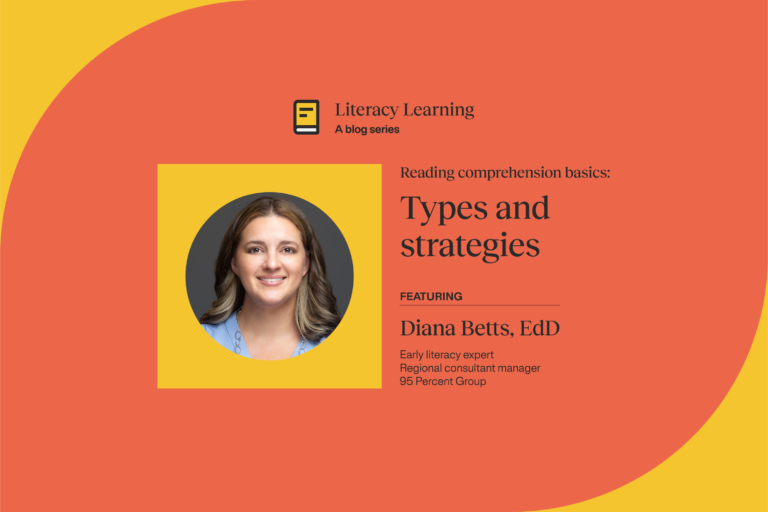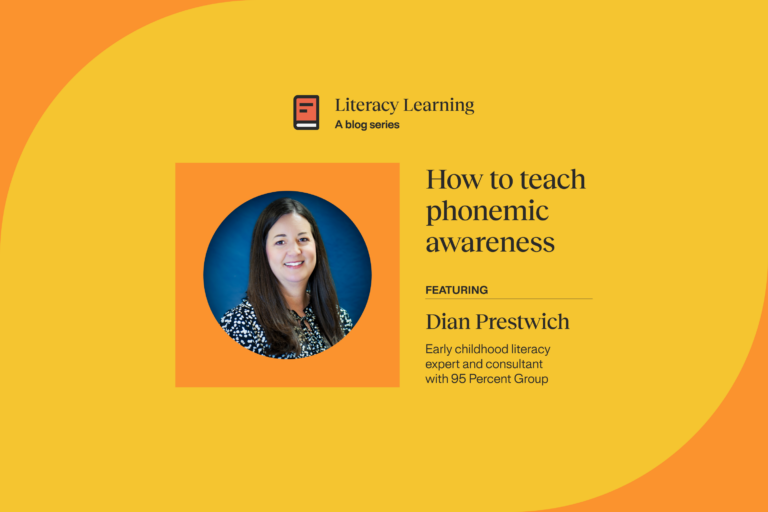Experts corner: Literacy rising in Mississippi
Yes, Mississippi’s success CAN be replicated to raise literacy achievement for all students

Mississippi was once ranked last in the nation for reading achievement. A group of dedicated people with a long range vision and commitment turned literacy in Mississippi around. Despite the pandemic, the state reached the national average for 4th-grade reading on the 2019 National Assessment of Educational Progress and scored above the national average in 2022.
Dr. Kymyona Burk, Mississippi’s former state literacy director and now a senior policy fellow at ExcelinEd, and Kelly Butler, CEO of the Barksdale Reading Institute, were key leaders in the state’s success. Laura Stewart, Chief Academic Officer of 95 Percent Group, hosted a webinar with Dr. Burk and Kelly Butler—Literacy Rising in Mississippi—discussing how Mississippi’s success CAN be replicated to raise literacy achievement for all students.
We invited Dr. Burk and Kelly Butler to respond to some follow up questions on important topics discussed in the webinar. This is a two-part series. Following is Part 1 with questions 1–4. Part 2 is coming soon!
Q 1. It’s clear that the success in Mississippi is the result of a long term, systemic approach that spans from pre-K teachers and programs to higher education teacher training programs and includes built-in accountability measures in certification, etc. No one thing was a magic bullet. For states who want to follow in your footsteps, how do you suggest they begin?
Kelly Butler:
Champions are important.
It helps to have one or more champions stepping out to declare a commitment for change. In our case it was Jim Barksdale, a former CEO of Netscape and a Mississippi native—Jim retired in the state and funded a reading institute. Jim was followed by another champion, the governor Phil Bryant, a dozen years later. The Legislature stepped up to the governor’s challenge. Carey Wright arrived from Washington, DC to energize the plan as state superintendent of education.
For other states, this could be one or more of the following: a philanthropist, the state superintendent of education, a school board member, legislature, or governor; even a parent group. At this point in time, many legislators (spurred by parents or the success of other states) are the ones getting the ball rolling. Kymyona probably has examples of these!
Dr. Kymyona Burk:
A comprehensive early literacy law and buy-in across the board is essential.
The legislature must adopt a comprehensive early literacy law that includes support for teachers and administrators, support for students, support for parents and families, and funding for implementation. The state education agency must ensure that there is an office dedicated to overseeing implementation and monitoring progress. None of this will work without buy-in, so it is critical to communicate with all stakeholders.
Q 2. In the May New York Times article, Mississippi Is Offering Lessons for America on Education, Nicholas Kristof points out the visionary leadership team and calls you out, Kelly, and the Barksdale Reading Institute. What is BRI doing today to support other states hoping to learn from Mississippi and replicate your success?
Kelly Butler:
Every state needs an independent voice.
Let’s start with some background: I’ve since told Nicholas that I thought this was a bit of an oversell! I just happened to have a privileged front row seat and the Barksdale banner. But I’ve also told Jim, it may be BRI’s resources/clout/independence that gets us to the table but we have to prove our worth once there. I felt a deep responsibility to not blow the opportunity that Kymyona would later describe as “the perfect storm.” And we were fully supported by Jim to try things and pivot if they didn’t work. It was the independence, nimbleness, and reading expertise of BRI that made us effective. Every state needs an independent voice that can push for change, say things the state agency people cannot (or are reluctant) to say, test ideas and methods, shine a light on problems, and devote resources to solving them…essentially, set a high bar for change and hold the system accountable.
To your question: We have shared specific aspects of the BRI model (essential role of coaches, importance of high-quality instructional materials or HQIM, appropriate assessments, purposeful interventions) that we believed were critical impact levers in our work leading up to the Literacy-Based Promotion Act, or LBPA. We point to the strategic roles of others in the process: a strong State Education Agency (SEA) leader, an effective and competent state literacy department, a legislature willing to fund what was being mandated. Barksdale Reading Institute has been an early and constant voice also for examining what educator prep programs are doing and created a training and coaching model (similar to the K-3 model) for early literacy faculty. This was another good example of our partnership with the Mississippi Department of Education, who funded LETRS slots to enable a faculty-only cohort. This work has spawned a multi-state initiative (The Path Forward). Twelve other states are now focused on the teacher prep piece. BRI passed the baton for this project over to The Hunt Institute in North Carolina.
Q 3. Kymyona, the 2013 legislative package called the Literacy-Based Promotion Act (LBPA) initially raised a lot of concern and fear with teachers and parents. But their fears of increased retention rates never manifested—retentions actually reduced. How did you calm the concerns in 2013 that retentions might unfairly impact schools and students in poverty? What advice do you have for states/districts wanting to implement such a policy? Please talk about the role monitoring has played in closing the gap and reducing retentions.
Dr. Kymyona Burk:
Communication is key.
Our strategy was to bolster communication about the support that would be provided to teachers and administrators, parents and families, and students, and focus on these supports that would prevent or intervene for reading difficulties, not the retention that could possibly happen at the end of third grade. The literacy team, in partnership with school districts, hosted in-person parent nights across the state each year to ensure that parents were informed about parental notification of reading deficiencies, parent resources to support reading at home, good cause exemptions, and how to partner with teachers.
Although the LBPA passed in 2013, the retention provision did not go into effect until spring 2015. We wanted to ensure that one test on one day would not be the sole determinant of third-grade retention; therefore, our Mississippi Reading Panel decided that students would have two additional opportunities to retest.
Through the state’s multi-tiered system of support model and as outlined in the Literacy-Based Promotion Act, kindergarten through third grade students are administered universal reading screeners three times per year to identify students at risk for reading failure that need intervention. In 2016 the LBPA was amended to include the development of individual reading plans for any student in kindergarten through third grade identified with a reading deficiency and fourth grade students promoted with a good cause exemption. This critical component ensures that interventions are documented, student progress is monitored, and parents are informed and included in the plan for student success.
For states considering the adoption of retention as an intervention strategy, communication is key. The approach must be comprehensive with state guidance for best practices and boots-on-the ground such as literacy coaches deployed to schools to support implementation. Other critical components—professional development, funding, high-quality instructional materials—must also be present and intentionally implemented.
You can read more about Mississippi’s Retention Study commissioned by the Foundation for Excellence in Education here.
Q 4. Kelly, in the webinar you talked about your approach of trying, monitoring, failing, abandoning. You gave the example of Parent Learning Centers which were unsuccessful and so you moved on to support what was working instead of sticking with the centers despite having invested a lot. How do you help other states/districts to get this lesson right up front?
Kelly Butler:
When an initiative or approach isn’t working, abandon it or pivot, quickly.
As much as schools talk about data (and there is a lot of it), too many are still not smart in how they use it. This is not just student data, but measurable outcomes in changing behaviors. I think this is due, in part, to the lack of clear goals for what specific approaches/initiatives are designed to achieve and a willingness to be honest about what’s not working and a willingness to change. Parent Centers were one example; the other was funding early literacy faculty. This effort was a total bust, so we approached the problem from a different angle instead of continuing to fund. More money after bad money is never a good idea. And that’s a big problem in education.
How to get this lesson right up front? Be intentional about setting measurable and meaningful goals. Revisit the goals periodically to see if you are on track; adjust accordingly. Keep the main thing the main thing (literacy achievement). If the initiative/approach is not working (even if there’s a huge investment in dollars), be prepared to abandon or pivot to stay focused on the goal.
Stay tuned for Part 2 with questions that focus on the role of higher education in educating the educators and expert insights on ensuring teacher and parent buy-in. We will also share resources for best practices and resources to go deeper.
Learn More
Are you interested in learning about how you can bring an effective and efficient structured literacy approach, grounded in the science of reading, to your school or district? Contact us today.



